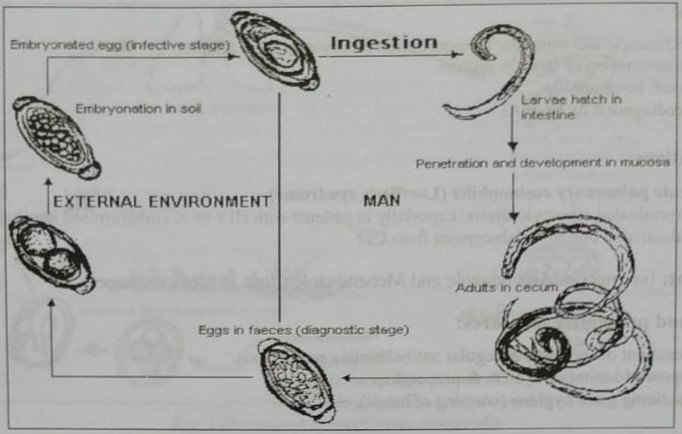Today is our topic of discussion Definition of Trichuriasis
Definition of Trichuriasis

Definition:
Infection withTrichuris trichiura is known as trichuriasis. Both larval and adult whipworms are found only in the intestines. They do not undergo tissue migration
Geographical distribution:
World wide, commoner in warm moist regions.
Epidemiological determinants:
Agent:
Trichuris trichiura (adult worm resembles a whip)
Egg:
Contains unsegmented ova; not infective when freshly passed.
Host:
Man; live in large intestine, particularly caecum, some times appendix.
Environment:
Tropical environment; damp soil

Mode of infection:
Orally with contaminated food and drinks.
Infective form:
Embryonated egg containing larva.
Life cycle:
Eggs come out with faeces → Development proceeds in damp soil → Man infected when egg containing larva swallowed with food or water→ Egg-shell dissolved by digestive juice → Larva emerges → Liberated larvae pass down into to caecum → Grow directly into adult worms → Embedded their body in the mucosa of intestine → Sexually mature within a month from ingestion of eggs → Gavid female begin laying egg → Cycle is then repeated.
Signs and symptoms:
1. Usually asymptomatic. May cause appendicitis when inhabit appendix.
2. In heavy infection cause:
a. Abdominal pain and discomfort
b. Mucous diarrhoea often with blood
c. Loss of weight
d. Prolapse of rectum occasionally in massive infection.
e. Anaemia

Fig: Life cycle of Trichuris trichiura
Complication:
1. Rectal prolapse (particularly in children)
2. Appendicitis
3. Proctitis
Diagnosis:
1. M/E of stool: Demonstration of egg.
2. Adult worm may occasionally be found in stool.
Treatment:
1. Mebendazole, thiabendazole (dose in previous pages).
2. Iron: iron deficiency and rectal prolapse.
Prevention:
1. Proper disposal of faeces,
2. Prevention of consumption of uncooked foods and vegetable.
See also :
